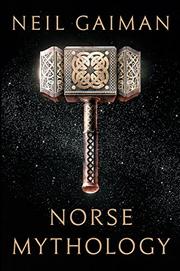Description
Fire and ice to begin, fire and ice to end. And it’s not going to end well, friends: first come the giants, then the all-ravening wolf, and then…. The ancient Norse had a cheerless view of the world: the gods are jealous, the elements fierce, the enemies—trolls and giants among them—many, and if you’re lucky you’ll be killed in battle and gathered up to Valhalla, “and there you will drink and fight and feast and battle, with Odin as your leader.” So writes Gaiman (The View from the Cheap Seats, 2016, etc.), famed for his intelligent fantasy novels but long under the spell of that great body of myth. As an English schoolboy, he reveled in Roger Lancelyn Green’s Myths of the Norsemen, a somewhat stodgy but valuable collection (as he notes, as a creature of his time, he was introduced to the Norse by way of the Mighty Thor comic books); now, as an adult, he gets to retell the tales, drawing from Snorri Sturluson’s Prose Edda, sagas in verse, and other sources. As he notes, rightly, that body of work is incomplete and perhaps corrupted by later Christian intrusions, so that it has to be viewed with some degree of suspicion; by the same token, he writes, so many of the goddesses in particular have been “lost, or buried, or forgotten,” overshadowed by the better-known likes of Thor, Odin, and Loki and all their busy kinfolk. Gaiman writes assuredly and evocatively and with a precise eye for the atmospheric detail: “Niflheim was colder than cold, and the murky mist that cloaked everything hung heavily,” he intones, catching the ancient alliteration. There’s plenty of mayhem and gore, and once the gods have had their fun, everything comes “crashing down and crumbling into ash and devastation.” But before that happens and Ragnarok descends, we have this lively book to cheer us along. Superb. Just the thing for the literate fantasy lover and the student of comparative religion and mythology alike.



Reviews
There are no reviews yet.